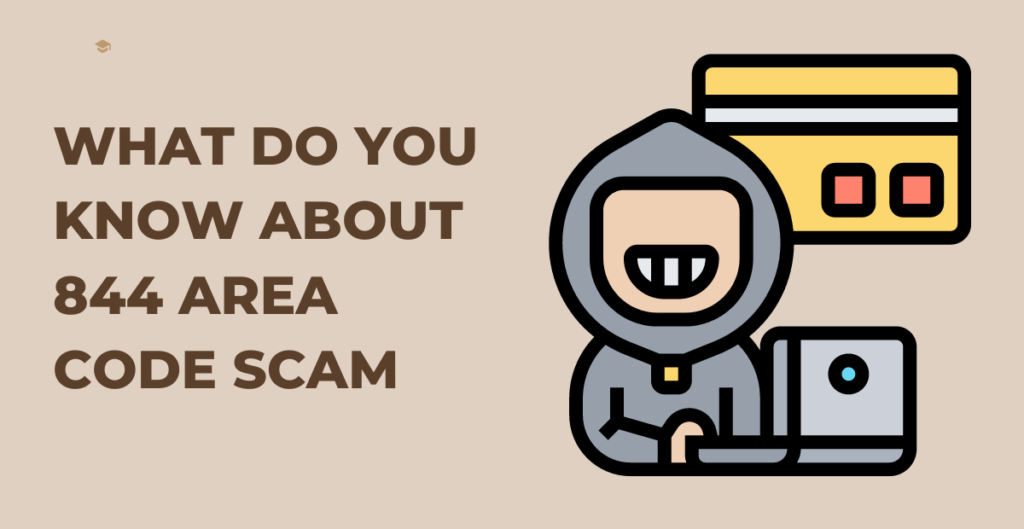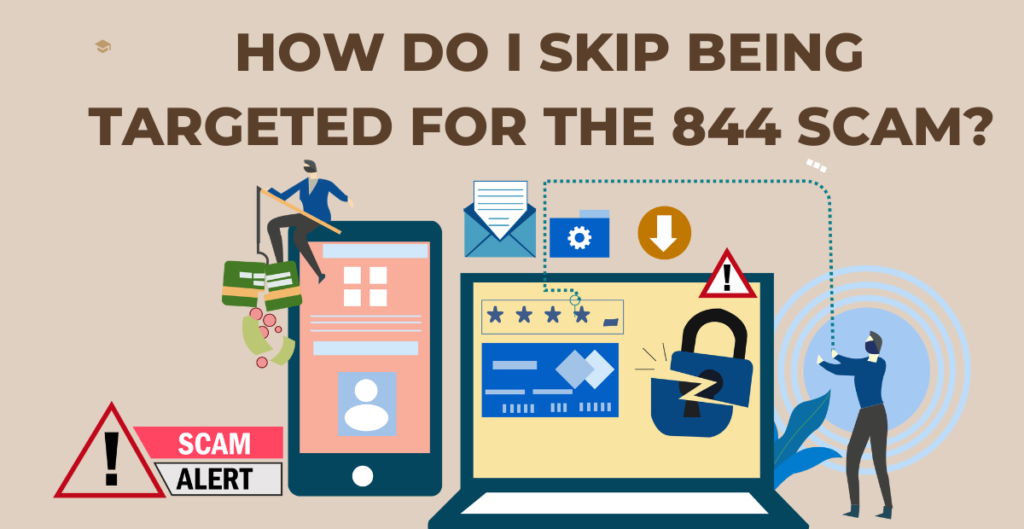
What Is the 844 Area Code Scam?
The 844 area code scam is a fraudulent activity where scammers use phone numbers that begin with the prefix 1-844 to trick people into giving away personal information or money. These scammers operate in various ways, including by pretending to be representatives of legitimate businesses, government agencies, or charities. In this article, we’ll explore how the 844 area code scam works and provide tips on how to avoid falling victim to it.
The 844 area code scam working
The 844 area code scam works by using phone numbers that appear to be legitimate but are actually operated by scammers. These numbers often begin with the prefix 1-844 and are used to impersonate well-known companies, such as Microsoft or Apple. The scammers may claim that the person’s computer is infected with a virus or that there is a problem with their account, and then try to convince the victim to provide them with remote access to their computer or sensitive information, such as credit card numbers.
Another way that scammers use the 844 area code is by pretending to be government agencies, such as the IRS or Social Security Administration. In this scenario, the scammer will claim that the person owes back taxes or has an issue with their Social Security account. They may threaten legal action or arrest if the person does not comply with their demands.
Charity scams are also prevalent in the 844 area code scam. Scammers will call people and ask for donations for fake charities or causes. They may use high-pressure tactics, such as telling the person that their donation is needed urgently, to try to get them to provide credit card information or make a payment.
How to avoid falling victim to the 844 area code scam
There are several ways to avoid falling victim to the 844 area code scam. First, it’s important to be wary of any unsolicited calls or messages. If someone claiming to be from a legitimate company or government agency contacts you, hang up and call the organization directly using a phone number from their official website.
It’s also essential to never give out personal information over the phone or through email, especially if you did not initiate the contact. Legitimate organizations will never ask for sensitive information, such as your Social Security number or credit card information, over the phone.
Another way to protect yourself from the 844 area code scam is to use a call blocking app or service. These tools can help identify and block scammer numbers, making it less likely that you will receive fraudulent calls or messages.
If you do receive a call from an 844 scammer number, it’s important to report it to the Federal Trade Commission (FTC). The FTC can investigate and take legal action against scammers, which can help prevent others from falling victim to the same scam.
In conclusion, the 844 area code scam is a fraudulent activity that uses phone numbers beginning with the prefix 1-844 to trick people into giving away personal information or money. Scammers may impersonate legitimate companies, government agencies, or charities, and use high-pressure tactics to convince people to provide sensitive information. To avoid falling victim to this scam, it’s essential to be wary of unsolicited calls or messages, never give out personal information over the phone, use call blocking tools, and report any suspicious activity to the FTC.
Scammers using 1-844 scammer numbers have become increasingly sophisticated in their attempts to find and trick victims. These scammers use various methods, including robocalls, phishing emails, and social engineering tactics, to convince people to provide personal information or money. In this article, we’ll explore how scammers using 1-844 scammer numbers find victims and provide tips on how to avoid getting involved in this scam.
How do 844 scammers find victims?
One common way that scammers using 1-844 scammer numbers find victims is through robocalls. These automated calls use pre-recorded messages to convince people to provide personal information or money. Scammers may use techniques such as spoofing, where they falsify the caller ID to make it appear as though the call is coming from a legitimate company or government agency. They may also use scare tactics, such as threatening legal action or arrest if the person does not comply with their demands.
Another way that scammers find victims is through phishing emails. These emails are designed to look like legitimate messages from banks, online retailers, or other organizations, and often contain links or attachments that, when clicked, can install malware on the person’s device. Once the malware is installed, scammers can steal personal information, such as login credentials or credit card numbers.
Social engineering tactics are also used by scammers using 1-844 scammer numbers to find victims. They may pose as legitimate companies or government agencies and use personal information obtained through data breaches to gain the person’s trust. Once they have established trust, they may ask for sensitive information, such as Social Security numbers or credit card information.
How do I ignore getting involved in this scam?
To avoid getting involved in the 1-844 scammer numbers scam, there are several things you can do. First, it’s important to be wary of unsolicited calls or messages. If someone claiming to be from a legitimate company or government agency contacts you, hang up and call the organization directly using a phone number from their official website.
It’s also essential to never give out personal information over the phone or through email, especially if you did not initiate the contact. Legitimate organizations will never ask for sensitive information, such as your Social Security number or credit card information, over the phone.
Another way to protect yourself from the 1-844 scammer numbers scam is to use a call blocking app or service. These tools can help identify and block scammer numbers, making it less likely that you will receive fraudulent calls or messages.
You can also take steps to protect your personal information online. This includes using strong passwords, avoiding public Wi-Fi networks, and being cautious of suspicious emails or messages.
If you do become a victim of the 1-844 scammer numbers scam, it’s important to report it to the Federal Trade Commission (FTC). The FTC can investigate and take legal action against scammers, which can help prevent others from falling victim to the same scam.
In conclusion, scammers using 1-844 scammer numbers are becoming increasingly sophisticated in their attempts to find and trick victims. They use various methods, including robocalls, phishing emails, and social engineering tactics, to convince people to provide personal information or money. To avoid getting involved in this scam, it’s essential to be wary of unsolicited calls or messages, never give out personal information over the phone or through email, use call blocking tools, and take steps to protect your personal information online.

I’m Also a Victim. What Should I Do?
If you have fallen prey to a 1-844 scammer number, you are not alone. Millions of people have received unsolicited calls or messages from these scammers. The first thing you should do is to stop all communication with the scammer. Do not engage in any conversation with them or provide them with any personal information.
Next, you should report the incident to the relevant authorities. This includes your local law enforcement agency, the Federal Trade Commission (FTC), and your telephone service provider. By reporting the incident, you are helping to prevent others from falling victim to the same scam.
It is also important to monitor your financial accounts closely. Check your credit card and bank statements regularly to ensure that no unauthorized charges have been made. If you notice any suspicious activity, report it immediately to your bank or credit card company.
Furthermore, you should consider placing a fraud alert on your credit report. This will notify potential lenders that your identity may have been stolen and that they should take extra precautions before extending credit in your name.
Finally, educate yourself and others about the 1-844 scammer numbers. Spread awareness about the tactics used by these scammers and how to avoid them. Remember, prevention is always better than cure.

How Do I Skip Being Targeted for the 844 Scam?
Receiving calls from 1-844 scammer numbers can be frustrating and potentially dangerous. The good news is that there are steps you can take to avoid being targeted by these scammers.
Firstly, be cautious when giving out your personal information. Do not share your phone number, email address, or any other personal details with unknown individuals or organizations. If you must provide personal information, make sure you are dealing with a reputable and trustworthy entity.
Secondly, be wary of unsolicited phone calls or messages. If you receive a call or message from an unknown number, do not answer or respond. Legitimate organizations will usually leave a message or follow up with an email or letter.
Thirdly, install call blocking software on your phone. This will help prevent calls from known 1-844 scammer numbers from reaching you. Additionally, some service providers offer call screening services that allow you to screen incoming calls and block numbers that you do not wish to receive.
Fourthly, register your phone number with the National Do Not Call Registry. This will prevent telemarketers and scammers from calling you. It is important to note, however, that this registry does not prevent all unwanted calls, and scammers may still try to contact you.
Lastly, educate yourself and others about the tactics used by 1-844 scammers. Stay informed about the latest scams and share information with your friends and family. By being proactive and vigilant, you can reduce your chances of falling victim to these scams.
In conclusion, while it is impossible to completely eliminate the risk of receiving calls from 1-844 scammer numbers, there are steps you can take to protect yourself. By being cautious, installing call blocking software, registering with the Do Not Call Registry, and staying informed about the latest scams, you can reduce your chances of being targeted by scammers.
Conclusion
1-844 scammer numbers have become a prevalent problem in our society. These scammers use various tactics to trick unsuspecting victims into divulging personal information or sending money. However, there are steps that can be taken to prevent falling victim to these scams.
If you have already fallen victim to a 1-844 scammer number, it is important to take action immediately. Stop all communication with the scammer, report the incident to the relevant authorities, monitor your financial accounts, and consider placing a fraud alert on your credit report. By taking these steps, you can minimize the damage caused by the scam and help prevent others from falling victim.
To avoid being targeted by 1-844 scammers, be cautious when giving out personal information, be wary of unsolicited phone calls or messages, install call blocking software, register your phone number with the National Do Not Call Registry, and educate yourself and others about the tactics used by these scammers.
It is important to note that these steps are not foolproof, and scammers may still try to target you. Therefore, it is crucial to remain vigilant and stay informed about the latest scams. By being proactive and taking steps to protect yourself, you can reduce the risk of falling victim to 1-844 scammer numbers.
In conclusion, the proliferation of 1-844 scammer numbers is a serious problem that requires attention and action. By taking steps to protect ourselves and educating others about these scams, we can minimize the damage caused by these scammers and help prevent others from falling victim. Remember, if you receive a call or message from an unknown number, always err on the side of caution and be wary of providing any personal information.






